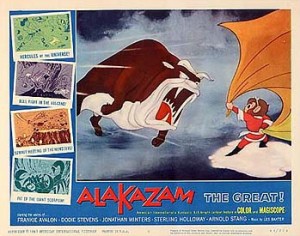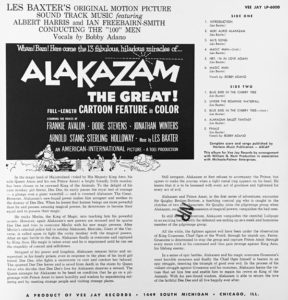A look at the soundtrack for a feature about a mischievous monkey monarch that may not be as notable for how well it succeeded as much as for what it influenced.

ALAKAZAM THE GREAT!
Original Movie Soundtrack
Music Composed by Les Baxter
Vocals by Bobby Adano
Vee-Jay Records LP-6000 (12” 33 1/3 RPM / Mono)
Released in 1960. Produced by arrangement with William G. Hunt Productions in association with Michaels-Palmer Enterprises. Adapted from the English Language Version by Lee Kresle, Lou Rusoff; from the Japanese Version by Osamu Tezuka, Goro Kontaibo, Keinosuke Uekusa; the Manga by Osamu Tezuka and Novel by Cheng’en Wu. Arranger/Conductors: Albert Harris, Ian Freebairn-Smith. Running Time: 26 minutes.
Songs: “Aliki Aliko Alakazam,” “Ali’s Song,” “Hey, I’m in Love Again,” “Magic Man,” “Blue Bird in the Cherry Tree,” “Under the Roaring Waterfall” by Les Baxter.
Instrumentals: Introduction, “Magic Man,” “Blue Bird in the Cherry Tree,” “Alakazam Ballet Fantasy,” Finale by Les Baxter.
 Alakazam the Great was based on a story that dates back to the 16th century in a book called Journey to the West by Cheng’en Wu. Familiar to fans of both Chinese and Japanese storytelling, the book was inspired by a real-life Monk’s 7th century journeys and expanded through mythology, legend and religion. The film, Americanized for 1960 U.S. audiences, changes the names of the characters and locations.
Alakazam the Great was based on a story that dates back to the 16th century in a book called Journey to the West by Cheng’en Wu. Familiar to fans of both Chinese and Japanese storytelling, the book was inspired by a real-life Monk’s 7th century journeys and expanded through mythology, legend and religion. The film, Americanized for 1960 U.S. audiences, changes the names of the characters and locations.
The renowned artist Osamu Tezuka adapted the legends in the 1950’s for a renowned manga, so Toei asked him to participate in the film. Though it was little more than a publicity move, Tezuka became enamored with animation and subsequently established Japan’s first TV animation studio, giving the world Astro Boy and Kimba the White Lion.
American-International Pictures cast the voices with well-known celebrities to help sell audiences on the film. For the lead role, American-International Pictures put Frankie Avalon at the top of the bill. This would be the beginning of a lucrative association between AIP and Avalon that would reach its peak with the seven “official” beach party movies and the ancillary movies that either traded on them by featuring their co-stars, their cameos or similar themes. It was not only a cottage industry that put AIP on the map, it defined an industry of independent low-budget filmmaking and cultural iconography from early-60s drive-in and matinee fodder to late-60s counterculture.
The record album version of Alakazam the Great was an unusual project for Vee-Jay Records, a very influential label in the history of R & B, rock and roll and jazz (they even released some of The Beatles’ earliest songs in the U.S.). Vee-Jay was not a children’s or a soundtrack label, and the album is a curious blend of both genres.
 The front cover, which combines various movie poster elements (“Bull fight in the volcano!” “Pit of the giant scorpion!”), lists the star voices of Frankie Avalon, Dodie Stevens (a 13-year old singer whose big hit at the time was “Tan Shoes and Pink Shoe Laces”, Jonathan Winters, Arnold Stang and Sterling Holloway. The back cover duplicates the logo and voice cast graphic.
The front cover, which combines various movie poster elements (“Bull fight in the volcano!” “Pit of the giant scorpion!”), lists the star voices of Frankie Avalon, Dodie Stevens (a 13-year old singer whose big hit at the time was “Tan Shoes and Pink Shoe Laces”, Jonathan Winters, Arnold Stang and Sterling Holloway. The back cover duplicates the logo and voice cast graphic.
The phrase “original soundtrack music” implies a program of instrumental and vocal selections directly from the film tracks. Strangely, Alakazam album is a story record, however, with complete songs and narration to bridge them.
If one were not to read the album notes carefully and miss “Vocals by Bobby Adano,” they might think Frankie Avalon sings on the album. Of course, he does not. He doesn’t completely do the voice of Alakazam in the film either, at least in the way the advertising might have led the public to believe. The reality is that Avalon’s voice is hardly ever heard in the feature at all. He only sings the songs, which are very short in the film.
Ali’s speaking voice in the film is Peter Fernandez—best known as the voice of Speed Racer. Why? One might assume that Ali’s character had so many lines that required dubbing, as opposed to Stevens, Stang, Winters and Holloway (who is off camera anyway), that Fernandez had the experience to get the job done with speed and skill.
The record album does not include any of the film cast members, nor much of the actual soundtrack music, because it contains something the movie could not. In order for American-International to market the movie with Frankie Avalon and Dodie Stevens, it had to have songs, but Alakazam was not a musical. There was only enough room in the dub for a few very short songs and some incidental singing. One of the best songs in the film, “Blue Bird in the Cherry Tree,” is only sung partially. They almost seem shoehorned in order to justify Avalon’s presence. There is not even a credit for the lyricist unless Les Baxter also wrote the words in addition to the music.
The only voice on the album is that of singer Bobby Adano, who is not in the film. Adano had a few minor hits, including “Eager Beaver Heart” and “This I Know”. But while Alakazam the album is not true to Alakazam the film, it does provide a permanent record of the songs in their entirety, almost like a demo disc.
This the only musical recording of the English language version of the film, though it might have been nice to also have Les Baxter’s score preserved as well. Baxter’s days as a band leader, recording artist of easy listening and “exotica” music and numerous American-International film scores may have left him out of the “A” list of other film composers, but his accomplishments were actually quite innovative and wide in variety.
“Alakazam The Great” Original Soundtrack Album
Bobby Adano was probably not a seasoned narrator; though to be fair, his read may have been affected by direction to keep the pace slow and juvenile. His singing is smooth and warm, however, and he does justice to the songs, particularly the signature ballad.



 GREG EHRBAR is a freelance writer/producer for television, advertising, books, theme parks and stage. Greg has worked on content for such studios as Disney, Warner and Universal, with some of Hollywood’s biggest stars. His numerous books include Mouse Tracks: The Story of Walt Disney Records (with Tim Hollis). Visit
GREG EHRBAR is a freelance writer/producer for television, advertising, books, theme parks and stage. Greg has worked on content for such studios as Disney, Warner and Universal, with some of Hollywood’s biggest stars. His numerous books include Mouse Tracks: The Story of Walt Disney Records (with Tim Hollis). Visit 






















































I remember seeing on TV as a kid and wondering why Buddha was suddenly King Whatever. Also why the pig carried a British title. Even as kids, we knew this was Japan — what was the point? It was a bit like 8th Man, where Japanese text on screen was verbally explained (“Look! He left this note in his native language.” … “On this side of the International Airport, the signs are in Japanese” …).
Wondering what the Japanese score sounded like. Did Baxter reference any of the themes or the style, or did he approach it as a complete original score?
I watched it again on YouTube and there could have been some overlap between the English and Japanese score. The entire mix, at least in that print, was out of kilter, with the music very loud and too much reverb. Again it may be too much to hope for, but a restored version in both languages would be nice. It is an important feature in many ways.
By “famous for what it influenced,” I was sure you meant that the character King Gruesome inspired the design of Super Mario’s nemesis Bowser.
That would be a third thing. Thanks for addiing it.
Well, someone had to say it!
Indeed. Someone did.
Just recently received a very good condition copy as a gift. Always a fan of Baxter’s film work, this one is a lot of fun!
Random recollection: The Medved boys ranked it in their “Fifty Worst Films” book, quoting a press book that suggested displaying a live monkey in a cage in theater lobbies.
Damn, I suppose it didn’t help if that was something that was done by theater managers thinking that was a perfect stunt for its time.
I’ll never forget when Harry Medved appeared on The Merv Griffin Show to plug the Worst Movies book and Burt Reynolds began asking him about all the people whose livelihoods depended on making movies, their families and so forth, how hard they all work, how often a movie isn’t usually bad by intent and wondered what good it served to fill a book with insults about the efforts of these people. The audience’s cheering was drowning out Medved’s reply about how he loved movies but the point was clearly made.
“Mmmmmmm,” said Merv. “We’ll be right back after this word from your local station.”
That Merv was a king!
I was a fan of this Vee Jay company in 1963 because of the singing group The Four Seasons. But I did not know of any of their soundtrack issues until now. While looking up something else this past week, I found another (non-animated) soundtrack on the label. Music was by Les Baxter.